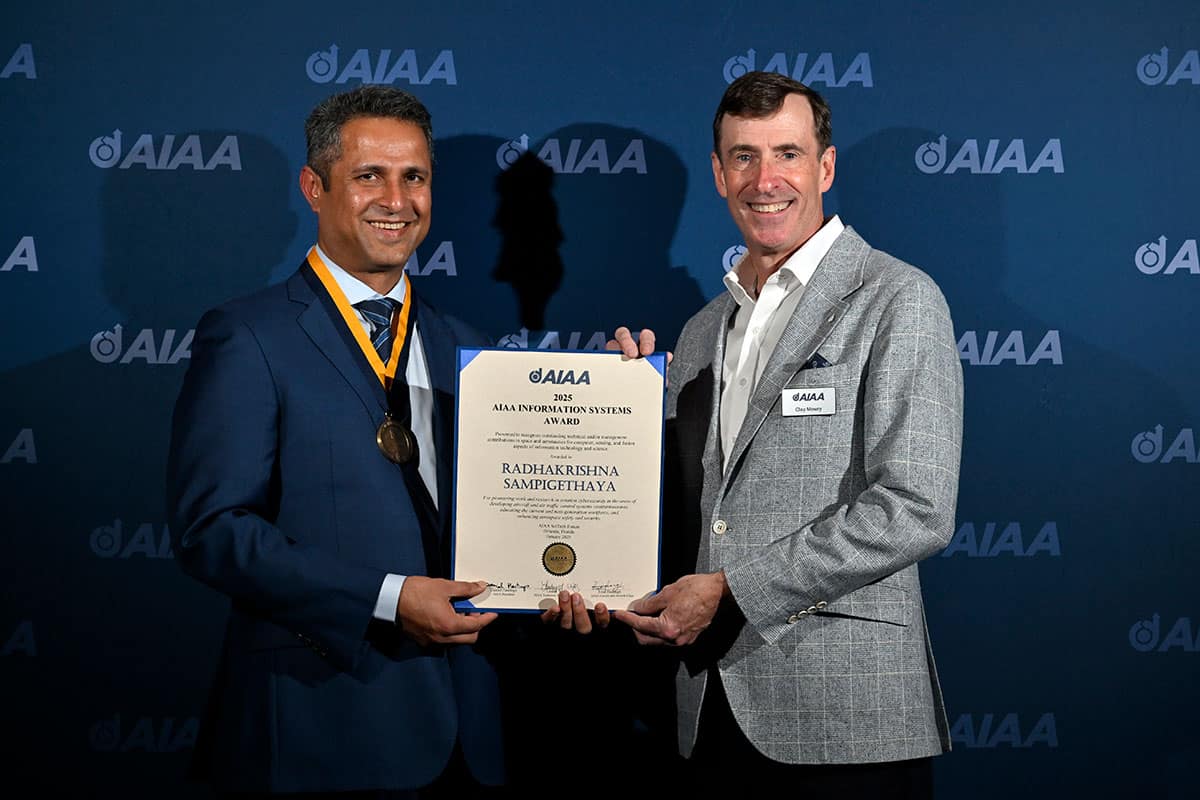Embry‑Riddle Faculty Member Honored for Pioneering Aviation Cybersecurity Research

For his outstanding contributions to aviation cybersecurity, Embry-Riddle Aeronautical University’s Dr. Krishna Sampigethaya has been named by the American Institute of Aeronautics and Astronautics (AIAA) as its 2025 AIAA Information Systems Award recipient.
The world’s largest aerospace society, AIAA, cited Sampigethaya, professor and chair for the Department of Cyber Intelligence and Security, for his “pioneering work and research in aviation cybersecurity,” particularly in “developing aircraft and air traffic control systems countermeasures.” AIAA also praised Sampigethaya for “enhancing aerospace safety and security” and for his commitment to educating the current and future generations of aviation cybersecurity professionals.
The AIAA Information Systems Award, which is given every two years, recognizes outstanding technical and management contributions that fall within the realm of aerospace information systems’ computer and sensing aspects. It was first awarded in 1977. Sampigethaya was presented the award at a Jan. 6 ceremony during the 2025 AIAA SciTech Forum in Orlando, Florida.
“I am deeply honored to receive the 2025 AIAA Information Systems Award and humbled to be recognized alongside such esteemed individuals in the aerospace community,” Sampigethaya said. “This award highlights the growing importance of advancing cybersecurity in aviation, a field I had the privilege of pioneering.”
Sampigethaya is the first faculty member from the College of Business, Security and Intelligence (CBSI) to earn the prestigious award, said Dr. Thomas Drape, dean of the college.
“Krishna has dedicated nearly 20 years to identifying and addressing critical aerospace threats. His efforts have helped to lay the foundation to make the skies safer and more secure for us all,” he said. “Krishna has also truly dedicated himself to our CBSI students, developing hands-on learning opportunities and curricula that ensure our graduates are amply prepared for the workforce.”
Sampigethaya began researching aviation cybersecurity in 2006 while earning his Ph.D. at the University of Washington in Seattle. He was one of the first researchers in the field and was vital to securing commercial aircraft and avionics systems while working at Boeing Research & Technology and United Technologies Corporation Research Center.
His current research interests include cyber-physical security and the impact cyber-physical threats have on air traffic controllers and pilots. His early work in this area led to standards discussions among industry and institutions, such as the Federal Aviation Administration.
As a member of the Prescott Campus faculty, Sampigethaya has been instrumental in several initiatives, including a workshop held last April, which convened government, industry and academic experts to address aviation cybersecurity challenges. The workshop was a first-of-its-kind collaboration among Embry-Riddle, NASA and the National Science Foundation (NSF).
He also partnered with Embry-Riddle students in 2020 to design the only student-led aviation cybersecurity capture-the-flag (CTF) competition. Sampigethaya and participating students have since offered the competition at AIAA events, the Aviation ISAC Summit and DEF CON, as well as to several other outlets.
Sampigethaya said the AIAA Information Systems Award represented “a significant milestone in a journey made possible by the support of my personal and professional connections.”
“I am grateful for the opportunity to contribute to the foundation of this field and to help educate and inspire the next generation of professionals dedicated to securing its future,” he added.
AIAA — which has nearly 30,000 individual members from 91 countries and 95 corporate members — also recently named Sampigethaya and two Aerospace Engineering faculty members to its 2025 Class of Associate Fellows.
